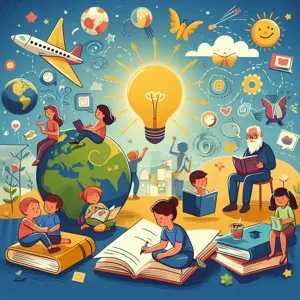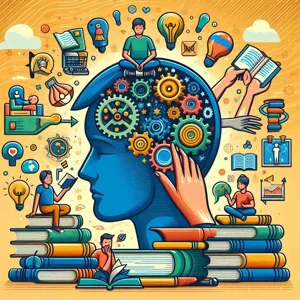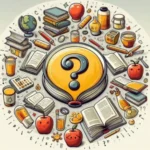In a world that often feels divided and disconnected, the power of empathy has never been more crucial.
Books have the unique ability to transport us into the minds and hearts of others, allowing us to experience life through different perspectives and fostering a deeper understanding of the human experience. Whether through poignant narratives, insightful essays, or compelling biographies, literature serves as a bridge that connects us to the diverse stories and struggles of those around us. In this blog post, we will explore ten powerful books that not only entertain but also cultivate empathy and understanding, encouraging readers to reflect on their own beliefs and biases. Each selection offers a rich tapestry of voices, experiences, and lessons that challenge us to open our hearts and minds, nurturing compassion in an increasingly complex world. Join us as we delve into these transformative reads that promise to enrich your perspective and inspire meaningful conversations.
1. Introduction: The Importance of Empathy in Today’s World

In an increasingly interconnected world, the ability to empathize with others has never been more crucial. Empathy—the capacity to understand and share the feelings of another—serves as the bedrock of meaningful relationships, effective communication, and social harmony. As we navigate through diverse cultures, beliefs, and experiences, fostering empathy can bridge gaps, dismantle prejudices, and cultivate a sense of community.
In recent years, we’ve witnessed a growing need for understanding amidst rising social tensions, political divides, and cultural clashes. Empathy allows us to step into someone else’s shoes, to see the world through their eyes, and to appreciate the nuances of their experiences. This emotional intelligence not only enhances our interpersonal relationships but also equips us with the tools to engage in constructive dialogues, solve conflicts, and promote inclusivity.
Books have long served as windows into the human experience, offering readers the chance to explore different perspectives and emotions. They invite us to walk alongside characters from all walks of life, fostering a deeper understanding of their struggles, triumphs, and journeys. In this blog post, we will explore ten powerful books that not only tell compelling stories but also challenge our views and encourage us to cultivate empathy in our everyday lives. As we delve into these narratives, we’ll uncover how they inspire us to listen more, judge less, and ultimately connect with others on a more profound level. Prepare to embark on a transformative literary journey that will enrich your understanding of the world and the people in it.
2. How Literature Fosters Empathy
Literature has a unique ability to transport readers into the minds and hearts of characters, allowing for a profound exploration of diverse perspectives and experiences. When we immerse ourselves in a well-crafted story, we step beyond our own realities, experiencing life through the eyes of others. This journey fosters empathy by enabling us to understand the emotions, struggles, and triumphs of people who may be vastly different from ourselves.
Many studies have shown that reading fiction, in particular, enhances our capacity for empathy. As we follow characters on their journeys, we become emotionally invested in their outcomes. We celebrate their victories and mourn their losses, living their experiences vicariously. This emotional engagement encourages us to reflect on our own feelings and behaviors, ultimately helping us to cultivate compassion for those around us.
Books that delve into complex social issues—such as racial injustice, mental health challenges, or the immigrant experience—serve as powerful tools for understanding. They provide insights that statistics and news reports often fail to convey, making the abstract tangible. For instance, novels like “The Kite Runner” by Khaled Hosseini or “The Hate U Give” by Angie Thomas not only tell compelling stories but also shine a light on the intricacies of human relationships and societal struggles, prompting readers to consider the wider world and their place within it.
In a time when divisions can often seem insurmountable, literature acts as a bridge, connecting us through shared human experiences. By reading widely and thoughtfully, we can nurture empathy within ourselves, fostering a deeper understanding of our fellow human beings. Let’s explore some powerful titles that exemplify this profound capability of literature to cultivate empathy and understanding in our lives.
3. Book #1: “To Kill a Mockingbird” by Harper Lee

**Book #1: “To Kill a Mockingbird” by Harper Lee**
Harper Lee’s timeless classic, “To Kill a Mockingbird,” stands as a pillar of American literature, captivating readers with its profound themes of empathy, morality, and social justice. Set in the racially charged atmosphere of 1930s Alabama, the novel is narrated through the innocent eyes of Scout Finch, a young girl whose understanding of the world is transformed by the events unfolding around her.
At its core, the story revolves around Scout’s father, Atticus Finch, a principled lawyer who defends Tom Robinson, an African American man falsely accused of raping a white woman. Through Atticus’s unwavering commitment to justice and integrity, readers are invited to confront the deeply ingrained prejudices of society. Lee masterfully illustrates the importance of viewing the world from others’ perspectives, encapsulated in Atticus’s famous advice: “You never really understand a person until you consider things from his point of view.”
As Scout navigates her childhood, she grapples with complex moral dilemmas and the harsh realities of injustice, prompting readers to reflect on their own beliefs and biases. The novel’s rich character development and poignant narrative encourage an emotional connection that resonates long after the final page is turned. “To Kill a Mockingbird” not only sheds light on the importance of empathy in dismantling prejudice but also serves as a powerful reminder that understanding and compassion are vital in the pursuit of a more just society.
In a world often divided by differences, Lee’s work remains a clarion call for empathy, urging us to listen, to learn, and to embrace the humanity in one another. Whether you’re revisiting this literary gem or discovering it for the first time, “To Kill a Mockingbird” offers invaluable insights that cultivate understanding and inspire action against injustice.
4. Book #2: “The Kite Runner” by Khaled Hosseini
**4. Book #2: “The Kite Runner” by Khaled Hosseini**
Khaled Hosseini’s deeply moving novel, “The Kite Runner,” is a poignant exploration of friendship, betrayal, and redemption set against the backdrop of a changing Afghanistan. Through the eyes of Amir, a young boy from a privileged background, and his loyal friend Hassan, the narrative delves into themes of class struggle, cultural identity, and the haunting echoes of past mistakes.
Hosseini masterfully uses the metaphor of kite flying to symbolize the highs and lows of their friendship, representing both the joy of connection and the pain of division. As Amir grapples with his feelings of guilt and shame after a devastating betrayal, readers are invited to reflect on their own moral choices and the consequences they bear. The emotional depth of the characters transcends cultural boundaries, allowing readers from all walks of life to empathize with their struggles.
As we journey through Amir’s redemption arc, we witness the stark realities of war, displacement, and the enduring power of love and forgiveness. The raw and honest storytelling compels readers to confront their own biases and assumptions, fostering a deeper understanding of the human experience. “The Kite Runner” doesn’t just tell a story; it implores us to embrace our shared humanity, making it an essential read for anyone seeking to cultivate empathy and insight into the lives of others. Whether you are familiar with Afghan culture or encountering it for the first time, Hosseini’s masterwork resonates on a universal level, urging us to recognize the threads that connect us all.
5. Book #3: “The Book Thief” by Markus Zusak

**5. Book #3: “The Book Thief” by Markus Zusak**
“The Book Thief” is a poignant narrative set against the harrowing backdrop of World War II, masterfully woven by author Markus Zusak. This novel, told from the unique perspective of Death, transcends the typical boundaries of storytelling, offering readers an intimate glimpse into the lives of ordinary people during extraordinary times.
At the heart of the story is Liesel Meminger, a young girl grappling with loss and hardship. After being sent to live with a foster family in the small German town of Molching, Liesel finds solace and refuge in words. Her love for books becomes a lifeline, helping her navigate the complexities of a world filled with fear, oppression, and despair. Zusak’s lyrical prose captures the beauty and brutality of life, compelling readers to connect deeply with Liesel’s struggles and triumphs.
As Liesel steals books, she discovers the power of storytelling to uplift the human spirit and foster connection amidst chaos. The relationships she forms—with her loving foster parents, the Jewish man hidden in their basement, and her childhood friends—reflect the diverse ways in which empathy can flourish even in the darkest of circumstances. Each character’s story intertwines with Liesel’s, highlighting the importance of compassion and understanding in a world often plagued by hatred.
Through its vivid imagery and emotional depth, “The Book Thief” challenges readers to confront their own perspectives and cultivate empathy for those whose lives may be worlds apart from their own. It serves as a powerful reminder that, regardless of the era or the circumstances, the shared human experience of love, loss, and hope can bridge even the widest divides. This remarkable novel is not just a tale of survival; it is a testament to the transformative power of empathy, inviting readers to reflect on their own roles in nurturing understanding and compassion in their lives.
6. Book #4: “A Man Called Ove” by Fredrik Backman
In “A Man Called Ove,” Fredrik Backman introduces readers to the curmudgeonly yet endearing protagonist, Ove, a man who seems to embody the essence of grumpiness. At first glance, Ove is an irritable old man with a rigid routine, a penchant for rules, and a deep disdain for anything that disrupts his orderly life. However, as the story unfolds, Backman peels back the layers of Ove’s character, revealing the poignant history and heartache that have shaped him into the man he is today.
Through a series of flashbacks, readers are transported into Ove’s past, discovering the love he had for his late wife, Sonja, and the profound impact she had on his life. This exploration of his memories fosters a deep sense of empathy, inviting readers to understand the vulnerability that lies beneath Ove’s gruff exterior. As new neighbors move in and inadvertently disrupt his solitary existence, Ove is thrust into a series of interactions that challenge his worldview and force him to confront the emotional scars he has been nursing for years.
Backman masterfully weaves humor and heartache, creating a narrative that resonates with anyone who has felt out of place or lost. The relationships Ove forms with his quirky neighbors—particularly with a spirited young girl named Parvaneh—illustrate the power of connection and community, demonstrating that empathy can blossom even in the most unlikely circumstances.
“A Man Called Ove” is not merely a story about an old man; it’s a testament to the human experience, showcasing how love, loss, and unexpected friendships can alter our perspectives and inspire us to embrace life anew. This book serves as a gentle reminder that everyone carries their own burdens and that a little kindness can go a long way in bridging the gaps between us. Through Ove’s journey, readers are encouraged to cultivate empathy, reminding us that understanding others, regardless of their outward demeanor, is essential to forging meaningful connections in our own lives.
7. Book #5: “The Fault in Our Stars” by John Green

“The Fault in Our Stars” by John Green is a poignant exploration of love, loss, and the human experience, told through the eyes of two teenagers grappling with illness. The story follows Hazel Grace Lancaster, a sixteen-year-old living with thyroid cancer, who is forced to attend a support group where she meets Augustus Waters, a charming and witty boy in remission. Their connection blossoms into a deep, transformative relationship that challenges their perceptions of life, mortality, and what it truly means to live.
What makes this novel particularly powerful in cultivating empathy and understanding is its raw honesty about the struggles faced by young people dealing with terminal illness. Green masterfully weaves humor and heartbreak, allowing readers to experience the joys and sorrows of Hazel and Augustus’s journey. Through their poignant conversations and shared experiences, readers are invited to reflect on their own lives and relationships, fostering a deeper appreciation for love and resilience in the face of adversity.
The narrative also touches on broader themes of grief and the impact of illness not only on the individuals affected but also on their families and friends. By immersing yourself in the world of “The Fault in Our Stars,” you gain insight into the complexities of human emotions, the fragility of life, and the importance of empathy in understanding the struggles of others. This book is not just a story about illness; it’s a celebration of life’s fleeting moments and the connections that sustain us, making it a must-read for anyone looking to cultivate a greater sense of compassion and understanding in their own life.
8. Book #6: “Just Mercy” by Bryan Stevenson
In “Just Mercy,” Bryan Stevenson crafts a poignant narrative that transcends the boundaries of conventional legal discourse, compelling readers to confront the deep-seated issues of injustice and inequality within the American justice system. The book centers around the case of Walter McMillian, a black man wrongfully convicted of murder in Alabama, and Stevenson’s relentless pursuit of truth and justice.
Through his eloquent storytelling, Stevenson not only exposes the harsh realities of systemic racism and bias but also invites readers to empathize with those trapped in a flawed system. His vivid descriptions and personal anecdotes bring to life the struggles faced by individuals who are often silenced and marginalized, urging us to see their humanity beyond the labels society imposes on them.
Stevenson’s reflections on mercy, forgiveness, and the power of hope resonate deeply, reminding us that empathy begins with understanding the stories of others. His call to action is clear: to cultivate a more just society, we must first confront our own prejudices and commit to listening to the voices that have been historically overlooked. “Just Mercy” is not just a book about law; it is a powerful reminder of our shared responsibility to care for one another, making it a must-read for anyone seeking to foster empathy and understanding in a world that often feels divided.
9. Book #7: “Educated” by Tara Westover
“Educated” by Tara Westover is a poignant memoir that takes readers on an extraordinary journey of self-discovery and resilience. Born to survivalist parents in rural Idaho, Westover was raised in a household that eschewed formal education and modern medicine. Her upbringing was marked by isolation and a lack of basic schooling, yet her insatiable curiosity and thirst for knowledge ultimately propelled her into a world she had never imagined.
As Westover recounts her experiences—from working in her father’s scrap yard to her eventual pursuit of higher education—she sheds light on the harsh realities of her upbringing while simultaneously celebrating the transformative power of education. Her narrative is both gripping and thought-provoking, inviting readers to reflect on the importance of understanding diverse perspectives.
Throughout the book, Westover’s struggle with her identity and her family’s values highlights the complexities of familial loyalty and the pursuit of personal truth. As she navigates her way through prestigious institutions like Harvard and Cambridge, readers witness her transformation as she grapples with the duality of her life: the pull of her family versus the drive to carve her own path.
“Educated” not only cultivates empathy for those who face similar struggles but also challenges readers to reconsider their own beliefs and the lengths they would go to seek knowledge. Tara Westover’s powerful storytelling serves as a reminder of the importance of education in bridging gaps of understanding and fostering compassion in a world often divided by differing experiences and viewpoints. This memoir is a must-read for anyone looking to deepen their understanding of resilience, family dynamics, and the power of education.
10. Book #8: “The Hate U Give” by Angie Thomas
In “The Hate U Give,” Angie Thomas crafts a powerful narrative that resonates deeply with contemporary issues of race, identity, and social justice. The story follows Starr Carter, a 16-year-old girl navigating the complexities of her life in two worlds: her predominantly Black neighborhood and her predominantly white private school. This duality shapes her experiences and perspectives, making her an incredibly relatable and nuanced character.
The inciting incident—a traumatic encounter with police that leads to the death of her childhood friend, Khalil—propels Starr into a whirlwind of emotions and decisions that challenge her understanding of herself and her community. Through Starr’s eyes, readers are invited to witness how systemic racism and police brutality impact not just individuals but entire communities. The book is a poignant exploration of the struggle for justice and the importance of finding one’s voice in the face of adversity.
What makes “The Hate U Give” particularly impactful is its ability to humanize the statistics and headlines often seen in the news. Thomas’s vivid storytelling immerses readers in the emotional landscape of grief, anger, and resilience, fostering a profound sense of empathy for those affected by similar real-world issues. As Starr grapples with her identity and the expectations placed upon her, readers are encouraged to reflect on their own beliefs and biases, making this book a vital read for anyone seeking to cultivate understanding in an increasingly divided world.
Through relatable characters and a gripping plot, “The Hate U Give” not only entertains but also educates, illuminating the urgent conversations around race and justice that are so crucial today. It stands as a testament to the power of literature to inspire change and empathy, making it a must-read for anyone interested in deepening their understanding of the challenges faced by marginalized communities.
11. Book #9: “Small Great Things” by Jodi Picoult
In “Small Great Things,” Jodi Picoult masterfully weaves a poignant narrative that delves into the complexities of race, privilege, and the nuances of human connection. The story centers around Ruth Jefferson, an experienced African American labor and delivery nurse who finds herself at the center of a legal battle when a white couple refuses to let her care for their newborn baby based solely on her race. This powerful premise serves as a catalyst for exploring the intersections of empathy and understanding in a deeply divided society.
Picoult’s writing immerses readers in the emotional landscapes of her characters, showcasing their fears, prejudices, and ultimately, their capacity for growth. Through Ruth’s perspective, readers experience the raw pain and injustice of systemic racism, while also gaining insight into the complexities of the characters who oppose her. The dual narratives provide a rich tapestry of viewpoints, encouraging readers to confront their own biases and assumptions.
The novel challenges us to contemplate the idea that empathy can be cultivated even in the most unlikely circumstances. It invites reflection on how our actions, no matter how small, can ripple through the lives of others, highlighting the profound impact individuals can have on one another. “Small Great Things” is not just a story about a legal struggle; it is a call to examine our own beliefs and to foster understanding in our daily lives. As readers turn the final pages, they are left with a renewed sense of awareness about the importance of compassion, making this book a vital addition to our list of powerful reads that nurture empathy and understanding.
12. Book #10: “Crying in H Mart” by Michelle Zauner
**Book #10: “Crying in H Mart” by Michelle Zauner**
In the poignant memoir “Crying in H Mart,” Michelle Zauner takes readers on an intimate journey through grief, identity, and the complexities of cultural heritage. Zauner, known for her work as the frontwoman of the band Japanese Breakfast, weaves a heartfelt narrative that not only chronicles her relationship with her Korean mother but also explores the profound impact of loss on her life.
Set against the backdrop of H Mart—a beloved Asian grocery store that serves as a symbol of comfort and connection—Zauner reflects on her childhood experiences, the struggles of navigating two cultures, and the deep bond she shared with her mother. The book captures the essence of familial love through the lens of food, tradition, and shared memories, illustrating how these elements intertwine to shape one’s identity.
As Zauner recounts her mother’s battle with cancer, readers are invited to witness the raw emotions of sorrow, nostalgia, and resilience. Her reflections on the rituals of cooking and the significance of shared meals become a powerful metaphor for the enduring connections that transcend the boundaries of life and death.
“Crying in H Mart” is not merely a personal story; it is a universal exploration of what it means to lose someone you love and how to navigate the complexities of grief. Zauner’s eloquent prose and vivid imagery evoke a deep sense of empathy, encouraging readers to reflect on their own relationships and the cultural narratives that define them.
Through this beautifully crafted memoir, Zauner reminds us of the importance of understanding and embracing our roots while honoring the memories of those we cherish. “Crying in H Mart” is a testament to the power of storytelling and its ability to foster empathy, making it a must-read for anyone seeking to deepen their understanding of the human experience.
13. How to Engage with These Books for Deeper Understanding
Engaging with books that cultivate empathy and understanding goes beyond simply reading the text; it involves immersing yourself in the narratives, reflecting on the experiences shared, and allowing those insights to shape your perspective. Here are some strategies to deepen your engagement with these powerful works:
1. **Active Reading**: As you read, take notes in the margins or keep a journal handy to jot down your thoughts, feelings, and reactions to the content. This practice not only helps you retain information but also allows you to articulate your emotions and thoughts as they arise, fostering a more profound connection with the material.
2. **Discussion Groups**: Join or create a book club focused on empathy-building literature. Engaging in discussions with others can illuminate different perspectives and interpretations, enriching your understanding of the themes and characters. Hearing how others relate to the material can deepen your appreciation for the complexities of human experiences.
3. **Reflective Practices**: After finishing a book, take some time to reflect on its impact on you. Consider questions like: How did the story challenge my beliefs? What emotions did it evoke? How can I apply the lessons learned to my own life? This introspective approach helps solidify the insights gained from the reading.
4. **Connect with Authors and Communities**: Many authors engage with their readers through social media or virtual events. Following them or participating in discussions can provide additional context about their work and the motivations behind their stories. Furthermore, connecting with communities that focus on empathy and social awareness can enhance your understanding of the broader implications of the narratives.
5. **Practical Application**: Challenge yourself to apply the lessons learned in your daily life. Whether it’s engaging in conversations with people from different backgrounds, volunteering for causes that resonate with the themes of the books, or simply practicing active listening, applying these insights in real-world scenarios can reinforce the empathetic understanding you’ve cultivated.
By integrating these strategies into your reading routine, you’ll not only enrich your experience with these impactful books but also foster a deeper understanding of the diverse human experiences that shape our world. Each story has the potential to inspire change, both within yourself and in your interactions with others.
14. Other Resources to Cultivate Empathy
While books can be a powerful gateway to understanding diverse perspectives, they are just one of many avenues available for cultivating empathy. Exploring a variety of resources can deepen your understanding and enhance your ability to connect with others. Here are some additional options to consider:
1. **Podcasts**: Engaging podcasts like *The Empathy Effect* or *On Being* dive into conversations with thought leaders, activists, and everyday individuals who share their stories and insights. These audio narratives often provide a more immediate emotional connection, allowing listeners to hear the nuances of experiences that differ from their own.
2. **Documentaries and Films**: Visual storytelling through documentaries can be incredibly impactful. Films such as *13th*, *Won’t You Be My Neighbor?*, and *The Pursuit of Happyness* offer poignant explorations of social issues, human rights, and personal resilience. Watching these narratives unfold can foster a deeper understanding of the challenges faced by others.
3. **Workshops and Community Programs**: Participating in local workshops or community programs focused on diversity and inclusion can provide hands-on experiences that promote empathy. These interactive sessions often encourage dialogue, collaboration, and shared experiences, allowing participants to step into another’s shoes in a supportive environment.
4. **Volunteering**: Engaging in volunteer work with organizations that serve different communities can be one of the most rewarding ways to cultivate empathy. Whether it’s serving at a local food bank, mentoring youth, or working with refugees, these experiences allow you to forge genuine connections and witness the realities of others’ lives firsthand.
5. **Online Courses**: Many platforms now offer courses specifically designed to develop emotional intelligence and empathy. Websites like Coursera and Udemy feature classes that delve into topics such as cultural competence, conflict resolution, and active listening skills.
By incorporating these resources into your journey, you can enrich your understanding of the human experience and foster a more empathetic worldview. Each medium has its unique strengths, and together they can paint a fuller picture of the complexities of life, helping us to connect, support, and uplift one another in meaningful ways.
15. Conclusion: The Lifelong Journey of Empathy and Understanding
In conclusion, cultivating empathy and understanding is not merely an exercise in reading; it is a lifelong journey that shapes our interactions, enriches our relationships, and ultimately enhances our humanity. The books highlighted in this list serve as invaluable guides, each offering unique perspectives and profound insights into the diverse tapestry of human experience. As you turn the pages of these powerful narratives, you are invited to step into the shoes of others, to feel their joys and sorrows, and to appreciate the complexities of their lives.
Empathy is a skill that requires nurturing and practice. It is developed not just through words on a page but through active engagement with the world around us. As you explore these titles, consider how the lessons learned can be applied in your daily life — in your conversations, your friendships, and your communities. It is through the act of listening, the willingness to understand different viewpoints, and the courage to challenge our own biases that we can truly grow.
Remember, this journey is ongoing. Each book you read, every story you encounter, and each person you meet contributes to your understanding of the human experience. Embrace the discomfort that sometimes comes with confronting difficult truths, and celebrate the moments of connection that remind you of our shared humanity. As you continue to seek out new narratives and experiences, you’re not just enriching your own life; you’re also fostering a more empathetic world, one reader at a time. So pick up a book, dive into a new perspective, and let the journey of empathy and understanding unfold.
As we conclude our exploration of the 10 powerful books that cultivate empathy and understanding, we hope you feel inspired to delve into these transformative reads. Each of these selections offers unique perspectives that challenge our preconceived notions and deepen our connections with others, reminding us of the shared human experience that binds us all. Whether you choose to embark on a journey through poignant narratives, insightful essays, or enlightening stories, these books are not just pages filled with words; they are gateways to greater compassion and awareness. We encourage you to pick one (or several) of these titles, immerse yourself in their lessons, and share them with others. In a world that often feels divided, fostering empathy through literature is a powerful step toward unity and understanding. Happy reading!






